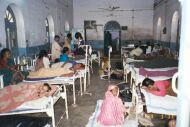|
|
|||||
|
|
Malaria ControlThe goal of malaria control in malaria-endemic countries is to reduce as much as possible the health impact of malaria on a population, using the resources available, and taking into account other health priorities. Malaria control does not aim to eliminate malaria totally. Complete elimination of the malaria parasite (and thus the disease) would constitute eradication. While eradication is more desirable, it is not currently a realistic goal for most of the countries where malaria is endemic. Malaria control is carried out through the following interventions, which are often combined:
Case ManagementPersons who are sick with malaria should be treated promptly and correctly. Malaria is often a debilitating disease that, when caused by Plasmodium falciparum, can be fatal. In addition, treatment eliminates an essential component of the cycle (the parasite) and thus interrupts the transmission cycle. The World Health Organization recommends that anyone suspected of having malaria should receive diagnosis and treatment with an effective drug within 24 hours of the onset of symptoms. When the patient cannot have access to a health care provider within that time period (as is the case for most patients in malaria-endemic areas), home treatment is acceptable. Prevention of InfectionInfection is prevented when malaria-carrying Anopheles mosquitoes are prevented from biting humans. Vector control aims to reduce contacts between mosquitoes and humans. Some vector control measures (destruction of larval breeding sites, insecticide spraying inside houses) require organized teams (for example, from the Ministry of Health) and resources that are not always available. An alternate approach, insecticide-treated bed nets (ITNs) combines vector control and personal protection. This intervention can often be conducted by the communities themselves and has become a major intervention in malaria control. Prevention of DiseaseAdministration of antimalarial drugs to vulnerable population groups does not prevent infection, which happens through mosquito bites. But drugs can prevent disease by eliminating the parasites that are in the blood, which are the forms that cause disease. Pregnant women are the vulnerable group most frequently targeted. They may receive, for example, "intermittent preventive treatment" (IPT) with antimalarial drugs given most often at antenatal consultations during the second and third trimesters of pregnancy. Partnerships for Malaria ControlSuccessful malaria control activities require coordinated actions by:
To enhance coordination, various partnerships have formed, the most prominent being the Roll Back Malaria global partnership. Activities for Malaria ControlThe main activities necessary for carrying out malaria control interventions are:
Barriers to Malaria Control
Malaria control is made difficult by several technical and administrative problems.
Page last modified : January 8, 2009 Content source: Division of Parasitic Diseases National Center for Zoonotic, Vector-Borne, and Enteric Diseases (ZVED)
|
|
|||||||||||||||||||||||||||||||||||||||||||||||||||||||||||||||||||||||||
| Home | Policies and Regulations | Disclaimer | e-Government | FOIA | Contact Us | ||||||
|



